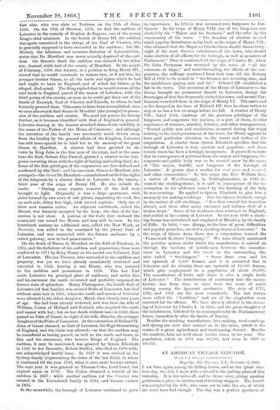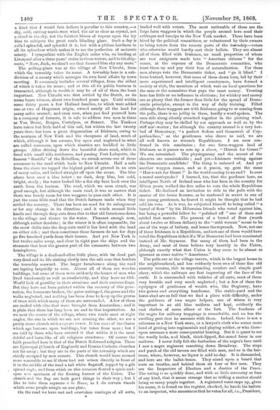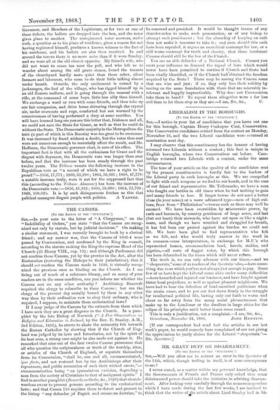AN AMERICAN VILLAGE ELECTION.
[Fans OM SPECIAL CORILEMPONDENT.] Bayridge, The Yarrows, L.1., November G, 1868. I AM here again among the falling leaves, and on the great elec- tion-day, the 3rd, I went with a friend to the polling-place of this township. It is live miles off, and he drove over, giving another gentleman a place in his two-seated trotting-waggon. The fourth was occupied by his wife, who came out to take the air, of which she must have had enough. The day was a perfect specimen of a kind that I would fain believe is peculiar to this country,—a dry, cold, cutting north-west wind, the air as clear as crystal, not a cloud in the sky, not the faintest bloom of vapour upon the icy blue to mitigate the great sun's blinding glare. Such a day is called splendid, and splendid it is, but with a pitiless hardness in all its splendour which makes it to me the perfection of meteoric misery. I sympathize with the English sailor who, on landing at Liverpool after a three years' cruise in these waters, said to his ship- mate, " Now, Jack, we shan't see that damned blue sky any more."
The polling-place was at the village of New Utrecht, from which the township takes its name. A township here is a sub- division of a county which manages its own local affairs by town meeting. It commonly includes several villages, from the oldest of which it takes its name ; and at this all its public business is transacted, although in wealth it may be of all of them the least important. New Utrecht was first settled by the Dutch, as its name bears witness, about two hundred years ago. Until within some thirty years a few Holland families, to which were added one or two of Huguenot origin, owned nearly all the land for many miles around ; and even now, when you find yourself here in a company of farmers, it is safe to address two men in three as Van Brunt, Bergen, Cortelyon, or Bennet. The Yankees have taken but little hold of this soil, but within the last twenty years there has been a great dispensation of Irishmen, owing to the nearness of New York and the cheapness of land, much of which, although it has owners, lies open and neglected in what are called commons, upon which shanties are huddled in little groups. After driving down the beautiful shore road, which is lined with small villa residences, and passing Fort Lafayette, the famona " Bastille" of the Rebellion, we struck across one of these commons to the road which leads to New Utrecht. Half a mile from the shore we topped the highest point of ground in an area of many miles, and looked straight off upon the ocean. The blue above bent over a blue below ; no dark, deep blue, but cold, bright, steely ; the water looked like a flat sky bent back over the earth from the horizon. The road, which we soon struck, was good enough, but although the main road, it was so narrow that there was barely room for two waggons to pass each other. It is just the same little road that the Dutch farmers made when they settled the country. There has been no need for its enlargement or for any change in its direction ; and it winds around little knolls and through deep cuts from this to that old farmhouse down to the village and thence to the water. Pleasant enough now, although rather desolate ; in the winter it is often impassable, for the snow drifts into the deep cuts until it lies level with the laud on either side ; and then sometimes these farmers do not for days go five hundred yards from their houses. And yet New York is but twelve miles away, and clear in sight pass the ships and the steamers that bear the greater part of the commerce between two hemispheres.
The village is a dead-and-alive little place, with its dead part very dead and its life sinking slowly into the salt ooze that borders the township seaward. The larger farmhouses along the road are lapsing languidly to ruin. Almost all of them are wooden buildings, but some of them were evidently the homes of men who lived handsomely as well as comfortably, and they have an Old- World look of gentility in their structure and their surroundings. But they have not been painted within the memory of this gene- ration, the fences are broken, the gates unhinged, the grass and the walks neglected, and nothing has been done to keep up the groves of trees with which many of them are surrounded. A few of them are roofed with tiles that were brought from Amsterdam ; and it is plain that there has long been an end to that importation. As we near the centre of the village, where two roads meet at right angles, the one in which we are not crossing the other, we see a pretty stone church with a squAre tower. It has sonr3 of the charm which age bestows upon buildings, but takes from man ; but I am told by those who have entered it that within it is the most doleful and barn-like of all religious structures. Of course the faith preached here is that of the Dutch Reformed religion. There are Episcopal (Church of England) and Roman Catholic churches not far away ; but they are in the parts of the township which are chiefly occupied by new comers. This church would have seemed more venerable to me if there had not arisen directly in front of it in the middle of the road a tall white flagstaff, topped by a gilt spread eagle, and from which on this occasion floated a spick-and- span 112W specimen of the flaming banner of the Union. The church and the flag are both good things in their way ; but 1 like to take them separate it /a Rasse, as I do certain viands which some people mingle on one plate,
On the road we have met and overtaken carriages of all sorts, • loaded well with voters. The most noticeable of these are the large farm waggons•in which the people around here send their cabbages and turnips to the New York market. These have been hired by the political committees, or volunteered by their owners to bring voters from the remote parts of the township—voters who otherwise would hardly cast their ballots. They are almost all of them filled with Irishmen, no small proportion of whom are raw emigrants made into " American citizens " for the nonce, at the expense of the Democratic committee, who
hunt them up and pay their fees of naturalization. For these men always vote the Democratic ticket, and " go it blind." I
have learned, however, that some of them down here, led by their more experienced and intelligent countrymen, have formed a society or club, the members of which vote on local questions for the man or the committee that pays the most money. Treating here has little or no influence in elections ; for whiskey and money are so plenty that the former does little for the spread of Demo- cratic principles, except in the way of daily training. Filled although these waggons are with Irishmen going to or coming from the polls, there is no jollity in them, hardly a word spoken. The men ride along silently crouched together in the piercing wind. Perhaps they may be chilled by our approach as well as by the stiff nor'-wester ; for although the country around is a very hot- bed of Democracy, "a perfect Sodom and Gomorrah of Cop- perheadistn," as the gentleman who drove us said, we are all well known as staunch Republicans. I am soon con- firmed in this conclusion ; for one farm-waggon load of Irishmen as it passes us sets up a cheer, "Hurrah for Grant !" We are astonished. The physiognomy and the accent of the cheerers are unmistakable ; and yet—Irishmen voting against the Democratic candidate ! The thing is unheard of. And yet another waggon comes, and as it passes, up goes the same " Hur-r-rah for Grant !" Is the world coming to an end ? Is ours a moral earthquake ? I learned, too, that the gardener here, an intelligent North of Ireland man who has been in the country for fifteen years, walked the five miles to vote the whole Republican ticket. He declined an invitation to ride to the polls with the master of the house because, as he confessed in secret to one of the young gentlemen, he feared it might be thought that he had sold his vote. As it was, he subjected himself to•being called " a barrel of flour" by his Hibernian friends who voted against him, but being a powerful fellow he " polished off " one of them and settled that matter. The present of a barrel of flour (worth about twelve or fifteen dollars) to the " ould woman" seems to be one of the ways of bribery, and hence the reproach. Now, not one of these Irishmen is a Republican, and not one of them would have voted the Republican ticket if a War Democrat had been nominated instead of Mr. Seymour. But many of them had been in the Army, and most of them believe very heartily in the Union, although exactly what that Union is they seem to be almost as ignorant as some native " Americans."
The polls are at the village tavern, which is the largest house in the neighbourhood, and has evidently been on e of those fine old country taverns, rich in unpretending comfort and simple good cheer, which the railways are fast improving off the face of the earth. It is surrounded with vehicles of all sorts, most of them very humble and very much neglected ; but a few of them the equipages of gentlemen of wealth who, like Dogberry, have two gowns and everything handsome. The stable-yard and the horse-shed are so full that we find a place with difficulty, under the guidance of two negro helpers, one of whom is very important in an old blue uniform and kepi, evidently the cast clothes of some officer at the fort. The fondness of the negro for military trappings is remarkable, and no less the swelling port that he assumes with them. Indeed, there is not a salesman in a New York store, or a lawyer's clerk who seems more fond of getting into regimentals and playing soldier, or who there- upon assumes a more consequential bearing. But it is queer to see the woolly locks, and black, thick-lipped, flat-nosed faces in our uniform. I never fully felt the barbarism of the negro's face until I saw a negro regiment marching down Broadway. The steps and porch of the old tavern are filled with men, and so is the bar- room, where, however, no liquor is sold to-day. It is dismantled, and here are the ballot-boxes. They stand upon a board that rests on trestles, and behind them sit four or five men. They are the Inspectors of Election and a Justice of the l'eace. The voting is so quickly done, and with so little ceremony or fuss of any kind, that it seems strange that so trifling a matter should bring so many people together. A registered voter steps up, gives his name, it is found on the register, checked, he hands his ballots to an inspector, who announces that he votes for all, i.e., President, Governor, and Members of the Legislature, or for two or one of these tickets, the ballots are dropped into the box, and the voter gives place to another. The unregistered voter answers, under oath, a question as to his place of residence, gives a reason for not having registered himself, produces a known witness to the fact of his residence, and his ballots are also then received. In and around the tavern there is no more noise than if it were Sunday, and we were all at the old church opposite. My friend's wife, who did not want to come too near the poll, and who left us to wander about among the old grave stones, found the tenants of the churchyard hardly more quiet than these sober, silent farmers and labourers, who seem to do their little talking almost under breath. Outside, the only excitement is caused by a jackanapes, the fool of the village, who has rigged himself up in an old Zonave uniform, and is going through the manual with a rifle, at the command of some boys, little less silly than himself. We exchange a word or two with some friends, and then take up our fair companion, and drive home shivering through the crystal air, under overcoats and rugs, comforted but not warmed by the consciousness of having performed a duty at some sacrifice. You will have learned long ere you see this letter that, Irishmen and all, we could not save the State for Grant, as well as that he could do without the State. The Democratic majority in the Metropolitan dis- trict (a part of which is this Bo3otia) was too great to be overcome. It was increased by fraud without a doubt, but the votes thus cast were not numerous enough to materially affect the result, and Mr. Hoffman, the Democratic governor elect, is sure of his office. The important fact is that with all the enthusiasm for Grant and the disgust with Seymour, the Democratic vote was larger than ever before, and that the increase has been steady through the past twelve years. The Tribune vaunts the following increase in the Republican vote as " a record of which we have a right to be proud!"-1856, 17,771 ; 1860, 33,290 ; 1864, 36,681 ; 1868, 47,778: a notable increase truly, were it not for the suppressed fact that this (according to the Tribune Almanac) has been the increase of the Democratic vote :-1856, 41,913 ; 1860, 59,890 ; 1864, 73,709 ; 1868, 108,025. It is by such disingenuous fetches as this that political managers disgust people with politics. A YANKEE.








































 Previous page
Previous page